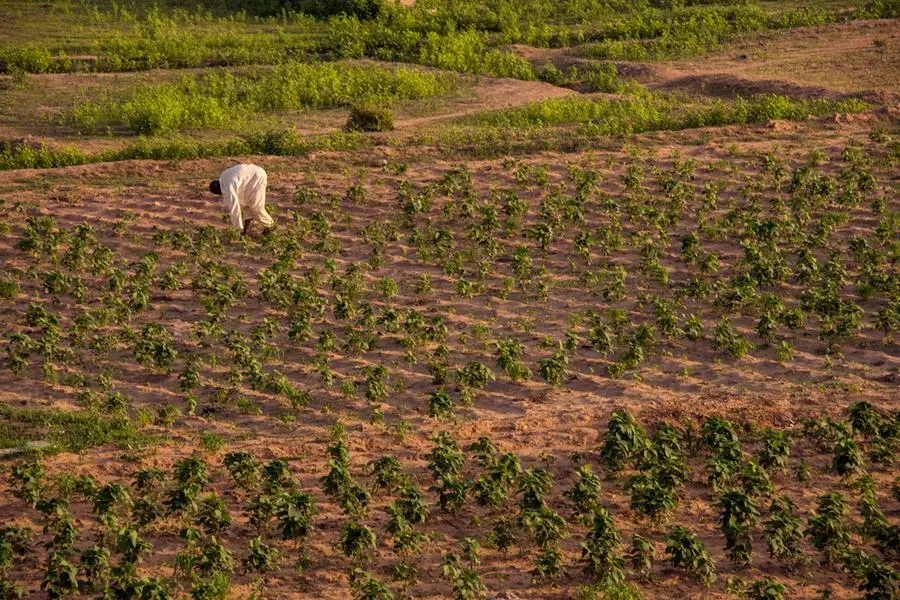PHOTO
IN recent times, Nigerians have voiced their concerns about the persistent challenges of hunger, inflation, and the general increase in prices of goods and commodities. These issues not only affect the livelihoods of individuals and families but also pose significant threats to food security and economic stability in the country. In response to these pressing challenges, an educationist who is also an agricultural expert Akande has shared insightful solutions aimed at tackling the root causes of these problems and fostering sustainable development in Nigeria.
In January, the UN estimated that more than 25 million people in Nigeria could face food insecurity this year—a 47% increase from the 17 million people already at risk of going hungry, mainly due to ongoing insecurity, protracted conflicts, and rising food prices. An estimated two million children under five are likely to be pushed into acute malnutrition in 2023. (Reliefweb ,2023). In response, Nigeria declared a state of emergency on food insecurity, recognizing the urgent need to tackle food shortages, stabilize rising prices, and protect farmers facing violence from armed groups. However, without addressing the insecurity challenges, farmers will continue to struggle to feed their families and boost food production.
In addition, parts of northwest and northeast Nigeria have experienced changes in rainfall patterns making less water available for crop production. These climate change events have resulted in droughts and land degradations; presenting challenges for local communities and leading to significant impact on food security. In light of these daunting challenges, it is imperative to address the intricate interplay between insecurity and agricultural productivity in Nigeria comprehensively. This necessitates a multifaceted approach that encompasses enhanced security measures, conflict resolution mechanisms, infrastructure development, climate-resilient agriculture, improved access to finance, and capacity building for farmers. By adopting such an integrated strategy, Nigeria can work toward ensuring food security, reducing poverty, and fostering sustainable economic growth in its vital agricultural sector. In this article, I suggest solutions that could enhance agricultural production and ensure that every state scales its agricultural production to a level where it can cater to 60% of the population. I commend the efforts of the Oyo State Government under the leadership of Governor Seyi Makinde who has paid due attention to developing agriculture in the state. The governor has implemented brilliant initiative to boost agriculture such as the construction of Oyo-Iseyin road, suspending revenue collection on farm produce, and providing funds for tractors and fertilizers. These solutions include:
Partnerships with tertiary tnstitutions: There is a need to emphasise the importance of collaborating with tertiary institutions to harness the potential of innovation and technology in boosting agricultural productivity. By partnering with these institutions, the government can leverage research findings and expertise to improve farming practices, develop high-yielding crop varieties, and enhance agricultural techniques. Additionally, providing access to farmlands for farming activities enables farmers to increase their production capacity and contribute to food security in the country. 2. Enhanced security for farmers: One of the critical barriers to agricultural productivity in Nigeria is the lack of security for farmers, particularly in rural areas. While I suggest ensuring safety and protection of farmers and their crops is essential for promoting food security and stimulating economic growth. By deploying security forces to agricultural regions and implementing proactive measures to combat rural insecurity, the government can create a conducive environment for farmers to cultivate their lands without fear of theft, vandalism, or attacks. 3. Engagement with research institutes: whikle there is also need to partner with research institutes; IITA, CRIN, NIHORT, IAR&T, FRIN, NCRI, NACGRAB, to drive innovation and knowledge exchange in the agricultural sector. By collaborating with these institutions, policymakers and stakeholders can access valuable insights, data, and expertise to inform evidence-based decision-making and policy formulation. Additionally, investing in agricultural research and development initiatives can lead to the discovery of novel solutions to pressing challenges, such as improving crop resilience to climate change and enhancing soil fertility.Investment in mechanized farming and arable land allocation: State and local governments play a pivotal role in promoting mechanized farming and providing arable land for farming in communities. Additionally, allocating arable land enables smallholder farmers to expand their operations and contribute to food security at the grassroots level. Nigeria can unlock the potential of its agricultural sector to address the pressing needs of its population and achieve sustainable development. Policymakers and stakeholders must heed Akande’s recommendations and take decisive action to ensure a food-secure future for all Nigerians.
Related PostsNOAN to hold conference on organic agricultureOur graduates are major contributors to Nigeria’s agricultural development —Owosibo, Provost, FCAH&PTAgriculture solution to hunger, inflation, food insecurity — Don
Policy recommendation
President Bola Tinubu’s declaration of a State of Emergency on food insecurity in Nigeria is a commendable step in addressing the pressing issue of rising food prices and its impact on citizens. This proactive approach demonstrates the government’s recognition of the challenges faced by ordinary Nigerians and its commitment to finding solutions.
The government’s immediate, medium, and long-term interventions provide a comprehensive strategy to tackle food inflation and ensure food availability and affordability. We would like to extend our heartfelt appreciation to the various Federal Government agencies for their invaluable contributions to advancing agricultural productivity in Nigeria which include.
1.Nigeria Agricultural Quarantine Service (NAQS)
2.Bank Of Agriculture (BOA)
3.Agricultural And Rural Management Training Institute (ARMTI)
4.Nigerian Agricultural Insurance Corporation (NAIS)
5.Nigeria Agricultural Seed Council
6.National Centre for Agricultural Mechanization (NCAM)
7.Nigeria Institute of Animal Science (NIAS)
8.Nigeria Institute of Soil Science (NISS)
9.Veterinary Council of Nigeria (VCN)
10.National Agricultural Land Development Authority (NALDA)
11.Agricultural Research Council of Nigeria (ARCN)
These agencies and other bodies have played pivotal roles in fostering innovation, providing financial support, offering training and capacity building, and ensuring the overall growth of the agricultural sector. Their dedication and commitment to enhancing food security, creating jobs, and boosting economic growth are commendable. With their continued collaboration and support, Nigeria’s agricultural sector is well-positioned to overcome challenges and thrive, ultimately improving the livelihoods of its citizens and contributing significantly to the nation’s development.
Also express our sincere appreciation to the Nigerian Incentive-Based Risk Sharing System for Agricultural Lending (NIRSAL) for its significant impact on agricultural productivity in Nigeria. NIRSAL has
played a crucial role in promoting access to credit and financial services for smallholder farmers, facilitating investments in modern farming practices, and enhancing the resilience of the agricultural sector. By providing risk-sharing mechanisms and incentives, NIRSAL has encouraged financial institutions to extend loans to farmers, thereby empowering them to increase their productivity and contribute to food security. The dedication of NIRSAL to supporting the growth of agriculture is a vital component of Nigeria’s agricultural development efforts, and we commend their efforts in driving positive change in the sector.
However, to further enhance food security and agricultural productivity in Nigeria, the following policy recommendations can be considered:
Sustainable Agricultural Practices: Promote and support sustainable farming practices, including organic farming, crop rotation, and agroforestry, to enhance long-term soil fertility and reduce the reliance on chemical fertilizers.
Research and Innovation: Increase funding for agricultural research institutions to develop high-yield crop varieties, disease-resistant strains, and climate-resilient agricultural technologies tailored to local conditions.
Market Access: Improve market access for smallholder farmers by investing in rural infrastructure, such as roads and storage facilities, to reduce post-harvest losses and enable farmers to reach wider markets.
Value Addition: Encourage value addition in agriculture by supporting the establishment of agro-processing industries and providing training to farmers on food processing and preservation techniques.
Youth Engagement: Develop specialized training programs to equip young people with agricultural skills and entrepreneurship training, fostering their participation in agribusiness.
Climate Resilience: Promote the use of drought-resistant and climate-adaptive crop varieties, implement water conservation practices, and establish weather information systems to help farmers adapt to changing weather patterns.
Access to Credit: Continue efforts to improve access to affordable credit for farmers, especially smallholders, to invest in modern farming equipment and inputs.
Security of Farmers: Strengthen security measures to protect farmers and farmlands, enabling them to work without fear of attacks or theft.
Export Promotion: Develop strategies to enhance the competitiveness of Nigerian agricultural products in international markets and streamline export processes to boost revenue from agricultural exports.
Data Collection and Analysis: Establish a robust system for collecting and analyzing data on agricultural production, food prices, and market trends to inform evidence-based decision-making.
Community-Based Initiatives: Encourage community-based agricultural initiatives, cooperatives, and farmer associations to foster knowledge sharing, collective bargaining, and resource pooling among farmers.
Also, more policy recommendations include;
Integrated Rural Development: Implement integrated rural development programs that focus on improving infrastructure, healthcare, education, and access to clean water in rural areas. These efforts will contribute to overall development and reduce vulnerabilities to extremism.
Conflict Resolution Mechanisms: Establish community-based conflict resolution mechanisms involving traditional and religious leaders to address farmer-herder conflicts, communal disputes, and other local conflicts swiftly and peacefully.
Security Sector Reforms: Undertake comprehensive security sector reforms to enhance the capabilities and accountability of security forces in addressing insurgent activities, while ensuring respect for human rights.
Livelihood Diversification: Promote livelihood diversification in rural areas by providing training and support for alternative income-generating activities beyond agriculture. This can reduce dependency on farming alone and mitigate the impact of agricultural disruptions.
Land Tenure Reform: Initiate land tenure reforms that provide clear and secure land ownership rights
for farmers and herders, reducing land-related conflicts and disputes.
Community Policing: Implement community policing programs that engage local communities in maintaining security, fostering trust between communities and law enforcement agencies.
Early Warning Systems: Develop and implement early warning systems that use technology and local networks to alert communities about security threats, enabling proactive responses.
Agro-Processing Zones: Establish agro-processing zones equipped with modern processing facilities to add value to agricultural produce, reduce post-harvest losses, and create job opportunities.
Research and Development Grants: Provide grants and incentives for research institutions, universities, and private companies to invest in research and development projects focused on improving agricultural productivity, climate resilience, and food security.
Financial Inclusion: – Promote financial inclusion for farmers and rural communities by expanding the reach of banking services, mobile banking, and microfinance institutions in underserved areas.
Regional Cooperation: – Collaborate with neighboring countries to address cross-border security challenges, such as insurgent activities and transhumance, through joint security operations and intelligence sharing.
Agricultural Insurance: – Promote the adoption of agricultural insurance schemes that protect farmers from losses due to crop failure, natural disasters, or theft.
Public Awareness Campaigns: – Launch public awareness campaigns to educate farmers and rural communities about the importance of security measures, conflict resolution, and sustainable agricultural practices.
Gender Inclusion: – Ensure that policies and programs are gender-inclusive, empowering women farmers and entrepreneurs with equal access to resources and opportunities in the agricultural sector.
Monitoring and Evaluation: – Establish a robust monitoring and evaluation system to assess the impact of policies and interventions, making data-driven adjustments as needed.
International Support: – Collaborate with international partners, organizations, and donors to access technical assistance, funding, and expertise in addressing insecurity and agricultural challenges.
Education and Skills Development: Enhance access to quality education and vocational training programs in rural areas. This will empower youth with the skills needed for both farming and non-farming employment, reducing unemployment and the attractiveness of extremist groups.
Community-Based Surveillance: Establish community-based surveillance systems where local communities actively participate in monitoring and reporting suspicious activities. These systems can help identify security threats early and improve response times.
Livestock Ranching and Grazing Reserves: Create well-managed livestock ranching systems and grazing reserves with proper infrastructure and security. This can mitigate farmer-herder conflicts and improve livestock productivity.
Youth Engagement Centers: Set up youth engagement centers in rural areas that offer training in agriculture, agribusiness, and entrepreneurship. These centers can serve as hubs for skill development and youth empowerment.
Smart Agriculture Technology: Promote the adoption of smart agriculture technologies, such as precision farming, remote sensing, and digital tools, to improve productivity and mitigate climate-related risks.
Public-Private Partnerships in Security: Collaborate with private security firms to augment government security efforts. This can include hiring private security personnel to protect agricultural areas and rural communities.
Farmer Cooperatives: Encourage the formation of farmer cooperatives to pool resources, share knowledge, and negotiate better terms with buyers and suppliers. Cooperatives can enhance smallholder farmers’ bargaining power.
Soil Health and Conservation: Implement soil health management and conservation practices to restore and maintain soil fertility. This includes promoting crop rotation, organic farming, and the use of cover crops.
Market Access Platforms: Establish digital market access platforms that connect farmers directly to buyers, reducing the role of intermediaries and ensuring fair prices for agricultural produce.
Agribusiness Incubators: Create agribusiness incubators and innovation hubs to support startups and entrepreneurs in the agricultural sector. These hubs can provide access to funding, mentorship, and market linkages.
Insurance for Farmers: Expand insurance coverage for farmers to protect against crop and livestock losses caused by insecurity and climate-related events. These insurance schemes should be affordable and accessible.
Export Promotion Agencies: Strengthen export promotion agencies to facilitate the export of Nigerian agricultural products to international markets. This can diversify revenue streams and boost the agricultural sector’s competitiveness.
Rural Electrification: Invest in rural electrification to provide reliable power sources for agro-processing, cooling, and storage facilities. This can reduce post-harvest losses and support value addition.
Local Seed Banks: Establish local seed banks that preserve and distribute indigenous crop varieties adapted to local conditions. This ensures seed diversity and resilience in the face of climate change.
Conflict Mediation Training: Train community leaders and mediators in conflict resolution and mediation techniques to manage disputes at the local level and prevent escalations.
Incentives for Private Investment: Offer tax incentives, grants, and land concessions to attract private investment in agriculture, particularly in value chain development, processing, and agribusiness ventures.
Sustainable Land Management: Promote sustainable land management practices, such as agroforestry and conservation agriculture, to improve soil fertility and enhance long-term agricultural productivity.
Data-Driven Decision-Making: Invest in data collection and analysis capabilities to inform evidence-based policymaking, monitor progress, and evaluate the impact of interventions.
International Collaboration: Strengthen collaboration with neighboring countries and international organizations to address regional security challenges and harmonize agricultural policies.
Conflict Sensitivity Training: Provide conflict sensitivity training to agricultural extension workers and development practitioners to ensure that development programs do not inadvertently exacerbate conflicts.
Timely Responses:
Develop rapid response mechanisms to provide humanitarian assistance, including food aid and shelter, to communities affected by insecurity or natural disasters.
Implementation Strategies
The Federal Government should take the following actions to ensure the successful implementation of policies and programs aimed at addressing the intertwined issues of insecurity and agricultural productivity in Nigeria:
Establish Specialized Task Forces or Committees: To oversee the effective implementation of specific policies and programs, the government should create specialized task forces or committees composed of experts and stakeholders. These groups can provide guidance, monitor progress, and offer solutions to challenges that may arise during implementation.
Allocate Adequate Budgets and Resources: Adequate financial allocations and resources should be earmarked to support the implementation of these policies and programs. This will ensure that the necessary infrastructure, personnel, and tools are available to execute initiatives effectively.
Promote Transparency and Accountability: To build trust and confidence among citizens, it is crucial to maintain transparency and accountability in the allocation and utilization of funds and resources. Clear reporting mechanisms and audits should be established to track expenditure and prevent misuse.
Conduct Regular Impact Assessments: The government should conduct frequent impact assessments to evaluate the effectiveness of policies and programs. Findings from these assessments should guide adjustments and refinements to strategies, ensuring that they remain relevant and achieve their intended objectives.
Foster Collaboration and Coordination: Collaboration among various stakeholders, including government agencies, civil society organizations, development partners, and local communities, is essential. Interagency coordination and cooperation will prevent duplication of efforts and enhance synergy in addressing the challenges.
Engage in Continuous Stakeholder Consultations: Regular consultations with stakeholders, including farmers, herders, community leaders, and experts, are vital. Feedback mechanisms should be established to gather input, address concerns, and adapt policies and programs to changing circumstances. This ensures that interventions remain responsive to the needs of the people.
Dr Akande, Founder, Akande Tunde’s Movement, writes in from Ibadan.
Copyright © 2022 Nigerian Tribune Provided by SyndiGate Media Inc. (Syndigate.info).





















